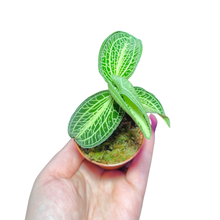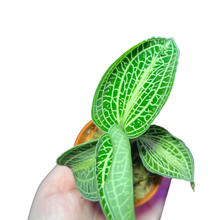Anoectochilus albolineatus (syn. Anoectochilus siamensis) is part of the Orchidaceae family and its native range is Indo-China in seasonal evergreen forests and evergreen hill forests. This terrestrial orchid has dark green ovate-elliptic leaves with an attractive silver-white veining. It has a creeping, ascending, rhizomatic growth habit.
Genus name comes from the Ancient Greek words anoiktos (ἀνοικτός) meaning "opened" and cheilos (χεῖλος) meaning "lip". Specific epithet is derived from the Latin words albus meaning ‘white’, linea meaning ‘line’ and atus meaning ‘that bears’.
Pot: ø 6cm.
Height: Approximately 6cm from base of pot.
Light: These plants grow on the forest floor in their native environment. Indirect light or shade, between 250-400 foot-candles. It is important for the plant to see the sky in order to survive.
Water: Anoectochilus albolineatus prefer the moss to be kept moist - providing that the plant is receiving adequate light.
Potting medium: Sphagnum moss or a mix of coco chips, coco coir, pine bark, perlite and worm castings, it’s also beneficial to add a layer of sphagnum moss to the top to keep the temperature up and moisture in.
Fertilising: Feed your plant monthly during the growing season or when you observe active growth. You can dilute fertiliser to half the recommended amount but never add more.
Temperature: 16-28°C; 22˚C is considered ideal during the day with cooler night temperatures.
Humidity: Higher humidity is best (80%), these plants work well in a terrarium. You can increase humidity by placing the plant on a watered pebble tray, under a cloche or using a humidifier.
Anoectochilus albolineatus is non-toxic.



